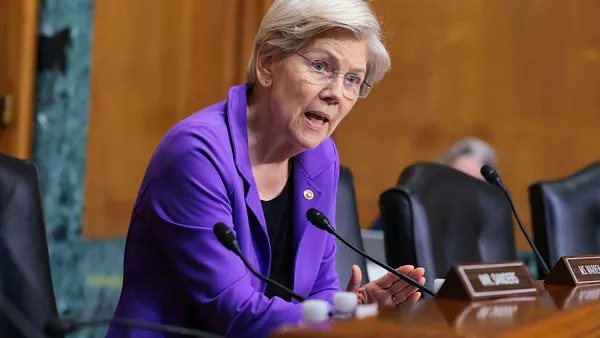Dive Brief:
- JPMorgan Asset Management and State Street Global Advisors said Thursday they were leaving Climate Action 100+, a $68 trillion climate action investor group that advocates for curbing the carbon footprint of the world’s largest corporate greenhouse gas emitters. Following the announcements, BlackRock said it would stay on as a member, but is transferring its participation to a smaller international arm.
- Both JPMorgan and State Street confirmed their exits in emailed statements to ESG Dive. JPMorgan attributed the departure to the development of its own climate risk engagement framework, while State Street said the coalition’s enhanced priorities for members are not in line with its independent decision-making. The news was first reported by the Financial Times.
- The Climate Action 100+ group is made up of over 700 investors and focused on engaging companies to improve their climate change governance, slash emissions and strengthen climate-related financial disclosures to “create long-term shareholder value,” according to its website. The group initially launched as a five-year initiative in 2017 but announced last year it plans to extend its remit to 2030.
Dive Insight:
JPMorgan and State Street’s departures and BlackRock’s revised membership come shortly after the climate action coalition announced its “phase 2” requirements in June 2023. These will require signatories to enhance their corporate disclosure and implement climate transition plans — an add-on to its original agenda that pushed for companies to make climate-related disclosures. The second phase also requires participating investors to submit an annual schedule of engagement specifying the climate action and escalation strategies they intend to implement.
“After careful review, State Street Global Advisors has concluded the enhanced Climate Action 100+ Phase 2 requirements for signatories will not be consistent with our independent approach to proxy voting and portfolio company engagement,” a spokesperson said in an emailed statement to ESG Dive.
In addition to developing its climate risk engagement framework, JPMorgan said it was not renewing its membership “in recognition of the significant investment it has made in its investment stewardship team and engagement capabilities.”
“The firm has built a team of 40 dedicated sustainable investing professionals, including investment stewardship specialists who also leverage one of the largest buy side research teams in the industry,” the New York City-based asset manager told ESG Dive via email.
The departures threaten the climate group’s strategy to use shareholder influence to push companies to mitigate their carbon footprint. With JPMorgan and State Street gone, BlackRock transferring its membership to BlackRock International, and Vanguard and Fidelity Investments never joining, Climate Action 100+ has failed to retain — or gain — the support of some of the world's largest asset managers.
Other prominent financial institutions such as Goldman Sachs, BNP Paribas, Invesco, Amundi SA and Pimco are still listed as current members on the group’s website.
Climate coalitions and financial institutions that join them have faced mounting pressure from Republicans over their ESG-aligned policies as of late.
In December, the House Judiciary Committee issued subpoenas to asset managers Vanguard and Arjuna Capital, alleging the firms failed to fully reply to earlier document requests related to their efforts to advance ESG policies. Vanguard was initially contacted by the committee in July because of the firm’s prominence as the world’s second-largest asset manager and its membership of the United Nations-backed Net Zero Asset Managers initiative from 2021 to 2022.
Vanguard said its association with NZAM has led to “confusion about the views of individual investment firms” and the choice to leave will not affect its commitment to helping investors “navigate the risks that climate change can pose to their long-term returns.”
















